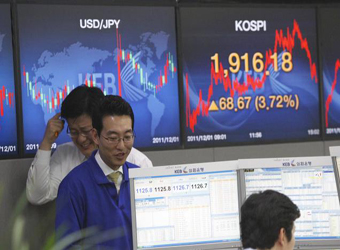Asian markets were mostly higher on Wednesday, as markets await the formal move by the U.K. to start an historic split with the European Union.
The Australian benchmark ASX 200 was up 0.92 percent, underpinned by a 1.38 percent increase in its energy sub-index and a 1.16 percent jump in its financials index.
The Australian army and emergency workers headed to areas in Queensland state that were hit by Cyclone Debbie.
Tourist resorts along Australia’s Great Barrier Reef and mainland coastal areas were belted with wind gusts stronger than 260 km per hour (160 mph) and there were reports of significant structural damage to homes and public infrastructure, Reuters reported.
Japan’s Nikkei 225 which initially opened positive, slipped 0.03 percent after the release of weaker-than-expected retail sales for February.
Retail sales grew just 0.1 percent in February year-on-year, much less compared to January’s growth of 1 percent, and missing expectations for a 0.5 percent annual increase.
The weak figures raise doubt about the strength of private consumption and highlights the difficulties for Japan to generate price inflation, Reuters reported.
Toshiba’s U.S. subsidiary Westinghouse is set to file for U.S. bankruptcy, in a bid to limit losses for the Japanese conglomerate.
Shares of Toshiba fell 0.23 percent at 216 yen per share, and are more than 22 percent lower since the start of the year.
In South Korea, the Kospi index advanced 0.67 percent.
Electronics giant Samsung Electronics shares were up 0.96 percent. It is expected to launch Galaxy S8 smartphone in New York later in the day, and in South Korea tomorrow.
The Shanghai composite was up 0.14 percent and Shenzhen composite slipped 0.08 percent. Hong Kong’s Hang Seng index was up 0.29 percent.
U.S. markets rose on Tuesday, after the Consumer Board Consumer Confidence Index hit 125.6, up from 116.1 in February, and the strongest reading since 2001.
The Dow Jones industrial average snapped its eighth day losing streak to jump 0.73 percent to 20,701.5, the S&P 500 rose 0.73 percent to close at 2,358.57 and the Nasdaq composite added 0.6 percent to finish at 5,875.14.
U.K. Prime Minister Theresa May signed the official letter to the European Council President Donald Tusk to invoke Article 50 of the Lisbon Treaty.
The letter once delivered to Tusk on Wednesday at 12:30 BST, will then begin the official two-year process of the U.K. leaving the bloc.
“The triggering of Article 50 is unlikely to create an immediate sea of change,” said Tim Riddell, director at Westpac Institutional Bank, in a Wednesday note.
“This is the start of the beginning of the negotiations. Once initial bargaining position details start to ping between EU and U.K. and are dissected by the media and markets, the enormity of the task ahead may start to weigh confidence and markets,” he explained.
The Scottish parliament on Tuesday backed First Minister Nicola Sturgeon’s bid for a new independence referendum, to be held in 2018 or 2019. The proposal was immediately rejected by the by the British government.
Japan’s Keidanren, a business group whose membership includes Toyota, Hitachi and other large Japanese investors in the U.K., is preparing a communiqué taking issue with May’s “no Brexit deal is better than a bad deal.”
The pound eased 0.25 percent at $1.2410 at 12:13 pm HK/SIN.
In the broader currency index, the dollar was stronger at 99.745 against a basket of currencies, above yesterday’s lows at 98.858 but still weaker compared to levels above 100 last weeks.
The dollar/yen was trading at 111.21 and the Australian dollar fetched $0.7643.
Brent crude continued to rise during Asian hours, up 0.39 percent to $51.53 a barrel, and U.S. crude rose 0.45 percent to $48.59.
Oil prices jumped more than 1 percent on Tuesday U.S. time, after Libyan supply was cut by a third due to armed faction action.
Source: CNBC
